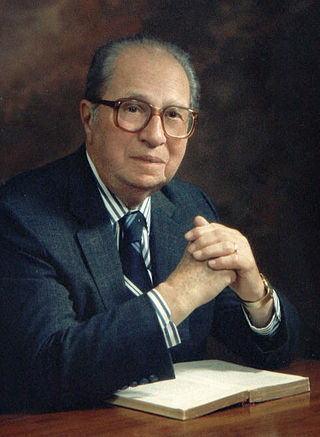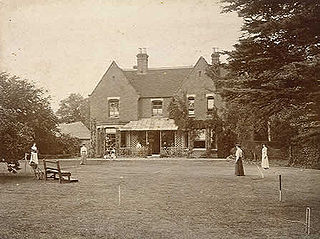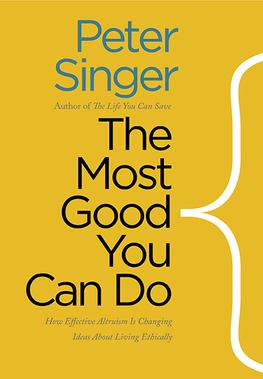
Mortimer Jerome Adler was an American philosopher, educator, encyclopedist, and popular author. As a philosopher he worked within the Aristotelian and Thomistic traditions. He taught at Columbia University and the University of Chicago, served as chairman of the Encyclopædia Britannica board of editors, and founded the Institute for Philosophical Research.

Political philosophy or political theory is the philosophical study of government, addressing questions about the nature, scope, and legitimacy of public agents and institutions and the relationships between them. Its topics include politics, liberty, justice, property, rights, law, and the enforcement of laws by authority: what they are, if they are needed, what makes a government legitimate, what rights and freedoms it should protect, what form it should take, what the law is, and what duties citizens owe to a legitimate government, if any, and when it may be legitimately overthrown, if ever.

Space is a three-dimensional continuum containing positions and directions. In classical physics, physical space is often conceived in three linear dimensions. Modern physicists usually consider it, with time, to be part of a boundless four-dimensional continuum known as spacetime. The concept of space is considered to be of fundamental importance to an understanding of the physical universe. However, disagreement continues between philosophers over whether it is itself an entity, a relationship between entities, or part of a conceptual framework.

In their most common sense, the terms thought and thinking refer to conscious cognitive processes that can happen independently of sensory stimulation. Their most paradigmatic forms are judging, reasoning, concept formation, problem solving, and deliberation. But other mental processes, like considering an idea, memory, or imagination, are also often included. These processes can happen internally independent of the sensory organs, unlike perception. But when understood in the widest sense, any mental event may be understood as a form of thinking, including perception and unconscious mental processes. In a slightly different sense, the term thought refers not to the mental processes themselves but to mental states or systems of ideas brought about by these processes.

George Philip Lakoff is an American cognitive linguist and philosopher, best known for his thesis that people's lives are significantly influenced by the conceptual metaphors they use to explain complex phenomena.
A teaching method comprises the principles and methods used by teachers to enable student learning. These strategies are determined partly on subject matter to be taught and partly by the nature of the learner. For a particular teaching method to be appropriate and efficient it has take into account the learner, the nature of the subject matter, and the type of learning it is supposed to bring about.
The relationship between Buddhism and science is a subject of contemporary discussion and debate among Buddhists, scientists and scholars of Buddhism. Historically, Buddhism encompasses many types of beliefs, traditions and practices, so it is difficult to assert any single "Buddhism" in relation to science. Similarly, the issue of what "science" refers to remains a subject of debate, and there is no single view on this issue. Those who compare science with Buddhism may use "science" to refer to "a method of sober and rational investigation" or may refer to specific scientific theories, methods or technologies.

Simon Lehna Singh, is a British popular science author, theoretical and particle physicist. His written works include Fermat's Last Theorem, The Code Book, Big Bang, Trick or Treatment? Alternative Medicine on Trial and The Simpsons and Their Mathematical Secrets. In 2012 Singh founded the Good Thinking Society, through which he created the website "Parallel" to help students learn mathematics.

Carlo Rovelli is an Italian theoretical physicist and writer who has worked in Italy, the United States and, since 2000, in France. He is also currently a Distinguished Visiting Research Chair at the Perimeter Institute, and core member of the Rotman Institute of Philosophy of Western University. He works mainly in the field of quantum gravity and is a founder of loop quantum gravity theory. He has also worked in the history and philosophy of science. He collaborates with several Italian newspapers, including the cultural supplements of the Corriere della Sera, Il Sole 24 Ore and La Repubblica. His popular science book, Seven Brief Lessons on Physics, was originally published in Italian in 2014. It has been translated into 41 languages and has sold over a million copies worldwide. In 2019, he was included by Foreign Policy magazine in a list of 100 most influential global thinkers.

Mary Beatrice Midgley was a British philosopher. A senior lecturer in philosophy at Newcastle University, she was known for her work on science, ethics and animal rights. She wrote her first book, Beast and Man (1978), when she was in her late fifties, and went on to write over 15 more, including Animals and Why They Matter (1983), Wickedness (1984), The Ethical Primate (1994), Evolution as a Religion (1985), and Science as Salvation (1992). She was awarded honorary doctorates by Durham and Newcastle universities. Her autobiography, The Owl of Minerva, was published in 2005.

TED Conferences, LLC is an American-Canadian non-profit media organization that posts international talks online for free distribution under the slogan "ideas worth spreading". It was founded by Richard Saul Wurman and Harry Marks in February 1984 as a tech conference, in which Mickey Schulhof gave a demo of the compact disc that was invented in October 1982. It has been held annually since 1990. It covers almost all topics—from science to business to global issues—in more than 100 languages. As of June 2015, more than 13,000 TEDx events have been held in at least 150 countries.

John Brockman is an American literary agent and author specializing in scientific literature. He established the Edge Foundation, an organization that brings together leading edge thinkers across a broad range of scientific and technical fields.
Judith Nisse Shklar was a philosopher and political theorist who studied the history of political thought, notably that of the Enlightenment period. She was appointed the John Cowles Professor of Government at Harvard University in 1980.

What Is Your Dangerous Idea?: Today's Leading Thinkers on the Unthinkable is a book edited by John Brockman, which deals with "dangerous" ideas, or ideas that some people would react to in ways that suggest a disruption of morality and ethics. Scientists, philosophers, artists, and various other groups of people have written in to the online salon called the Edge, where thinkers in several areas post and discuss their ideas. This collection of responses forms the entirety of the book. The basic concept behind the book is "to gather a hundred of the most brilliant minds in the world in a room, lock them in, and have them ask each other the questions they were asking themselves".

The Stone Tape Theory is the speculation that ghosts and hauntings are analogous to tape recordings, and that mental impressions during emotional or traumatic events can be projected in the form of energy, "recorded" onto rocks and other items and "replayed" under certain conditions. The idea draws inspiration and shares similarities with views of 19th-century intellectualists and psychic researchers, such as Charles Babbage, Eleonor Sidgwick and Edmund Gurney. Contemporarily, the concept was popularized by a 1972 Christmas ghost story called The Stone Tape, produced by the BBC. Following the play's popularity, the idea and the term "stone tape" were retrospectively and inaccurately attributed to the British archaeologist turned parapsychologist T. C. Lethbridge, who believed that ghosts were not spirits of the deceased, but were simply non-interactive recordings similar to a movie.
David Cayley is a Toronto-based Canadian writer and broadcaster, who is known for documenting philosophy of prominent thinkers of the 20th century - Ivan Illich, Northrop Frye, George Grant, and Rene Girard. His work has been broadcast on CBC Radio One's programme Ideas.
The Edge Foundation, Inc. is an association of science and technology intellectuals created in 1988 as an outgrowth of The Reality Club. Its main activities are reflected on the edge.org website, edited by publisher and businessman John Brockman. The site is a critically noted online magazine exploring scientific and intellectual ideas.

Clive Thompson is a Canadian freelance journalist, blogger, and science and technology writer.

The War of the Worlds is a science fiction novel by English author H. G. Wells. It was written between 1895 and 1897, and serialised in Pearson's Magazine in the UK and Cosmopolitan magazine in the US in 1897. The full novel was first published in hardcover in 1898 by William Heinemann. The War of the Worlds is one of the earliest stories to detail a conflict between humankind and an extraterrestrial race. The novel is the first-person narrative of an unnamed protagonist in Surrey and his younger brother in London as southern England is invaded by Martians and is one of the most commented-on works in the science fiction canon.

The Most Good You Can Do: How Effective Altruism Is Changing Ideas About Living Ethically is a 2015 Yale University Press book by moral philosopher and bioethicist Peter Singer describing and arguing for the ideas of effective altruism. As a follow-up to The Life You Can Save, which makes the moral argument for donating money to improve the lives of people in extreme poverty, the new book focuses on the broader question of how to do the most good.















